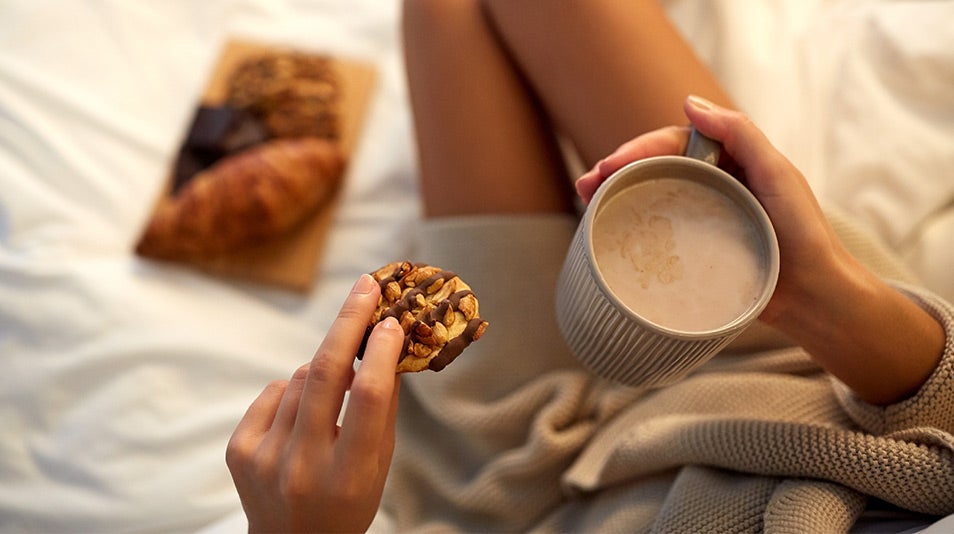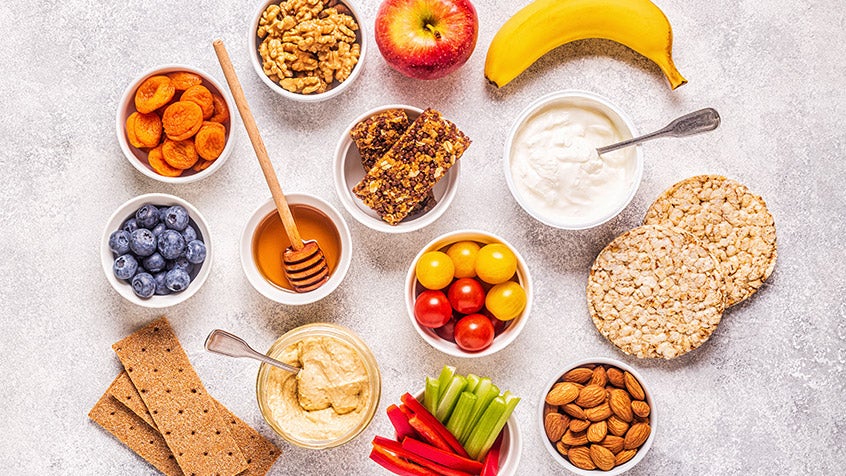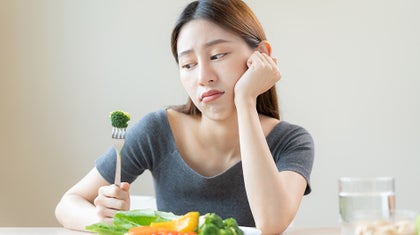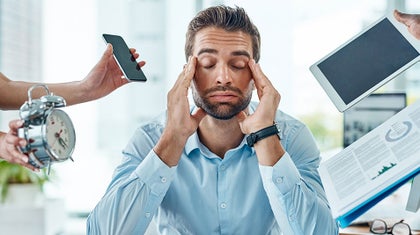I’m always hungry before bed, what should I do?
by Rachel Scoular on Thursday 01 September 2022
4 min read
Eating after dinner can be a bit of a taboo, often frowned upon and previously discouraged with popular diet phrases like ‘no carbs after dark.’ But what if you DO feel hungry before bed? Are you allowed to eat? We are speaking with APD Dietitian and Nutritionist, Rachel Scoular (also known as @rachelscoular on Instagram) to get the low-down.
Many people believe it is a bad idea to eat before bed, often fearing that eating straight before sleep will lead to weight gain. This belief is commonly built on the idea that our metabolism is slower at night. You may be relieved to know that is not always the case as our basal metabolic rate is relatively consistent throughout the day. Physiologically, there is not a strong link between eating before bed and weight gain. But let’s take a look further…
Hunger vs. cravings
We often confuse hunger with cravings. It is important to distinguish the differences between the two to first understand what sensation you are feeling after dinner, is it hunger or is it a craving?
By definition, hunger is ‘the painful sensation or state of weakness caused by the need for food.’ Hunger is the result of communication between the stomach and brain signalling the need for energy. When our body is hungry, our stomach may rumble and feel empty and our brain may send out signals via headaches, irritability (aka hangery) or we may have difficulty concentrating. Hunger does not go away after time and only food will cause the pain to cease. On the flip side, cravings are different to the feeling of hunger. To ‘crave’ something means to long for or to have a great desire. Generally, the foods you crave are not a necessity. Cravings are often triggered by emotions (stress, boredom) or a fondness for a certain food. In most cases, only the specific food or type of food you are craving will satisfy you. This means you may often crave something when you are not actually hungry.
No carbs after dark?
Our bodies require a consistent supply of carbohydrates for both fuel and energy production. Carbohydrates (found in wholegrains, breads, cereals, legumes) are the most efficient form for providing energy to the body. If you are regularly training, it is important to consume carbohydrates at every main meal, dinner included. Minimising carbs after dark may also leave you feeling more lethargic the following day. Avoiding carbohydrates at dinner will simply cut out calories, which may be helpful for weight loss if you are wanting to achieve a calorie deficit. However, it may not help with hunger levels and may leave you feeling more ravenous after dinner and lead you to make poor snack decisions.
Is it bad to eat before bed?
Going to bed with a grumbling stomach will often leave you lying awake and restless at night. If you do choose to eat before bed, it is important to focus on what you eat and how much of it. Most desserts and traditional TV treats are usually high in sugars, fat, and saturated fat, all of which can easily increase your calorie intake. Regular consumption of high-calorie foods may lead to weight gain down the track, so these foods are best left for special occasions.
If you are choosing to eat before bed, the best decisions are:
- Dairy foods - try a glass of milk or a small tub of yoghurt. Both are a rich source of tryptophan, an amino acid required to produce melatonin, a compound that promotes sleep.
- Wholegrains – try a piece of toast, plain popcorn, small muesli bar or serve of cereal. These are rich sources of dietary fibre. Fibre keeps you feeling fuller for longer, it is also great to settle your stomach.
- Fruit – a serving of fruit will help satisfy your sweet tooth, while providing an assortment of nutrients to support general health and wellbeing.
Rachel’s recommendations
- Prioritise the protein – foods that are high in protein, such as meats, dairy, legumes, nuts, and seeds, are all satiating. This means they help keep you feeling fuller for longer. Aim to include 1-2 protein sources in your dinner meal.
- Make a winner-dinner – ensure you are eating a substantial balanced dinner. If you feel hungry soon after your night time meal, it may be a good idea to add to your dinner plate. To fill your plate, I suggest adding extra vegetables, or low GI carbohydrates like pasta, quinoa, brown rice.
- Smart snacks – if you love a snack to tie you over, prioritise wholefoods and skip the highly processed treats.
- Wake up hungry – waking up hungry is a positive sign of eating a sufficient dinner. If you wake up feeling stuffed or sluggish, this is likely to be an indicator of over consuming food before bed. Conversely, waking up feeling fatigued may be a sign of insufficient fuel.
Free coaching session
Did you know, when you join Virgin Active, your membership includes one free coaching session with a Personal Trainer? They will assist you to develop a program that is tailored to your goals. Have a helpful hand guide you when creating new habits and rituals into your health and wellness journey with some of the best professionals in the industry.
More about Rachel Scoular
A leading Australian APD (Accredited Practising Dietitian) and Nutritionist, Rachel Scoular has a wealth of experience as a nutrition consultant in food industry, media, and corporate nutrition. Passionate about helping people look and feel their best, Rachel loves nothing more than using quality nutritional advice to empower others. Hear more about Rachel over on her Instagram or www.rachelscoular.com.
Related articles
Move
3 min read
Our 2026 ins and outs for wellness
Nourish
3 min read
Food mind games: how stress affects your appetite
Unwind
3 min read
Are you burnt out?
Enjoying our blog?
Sign up to our newsletter to get updates on training, healthy living, news and events.




